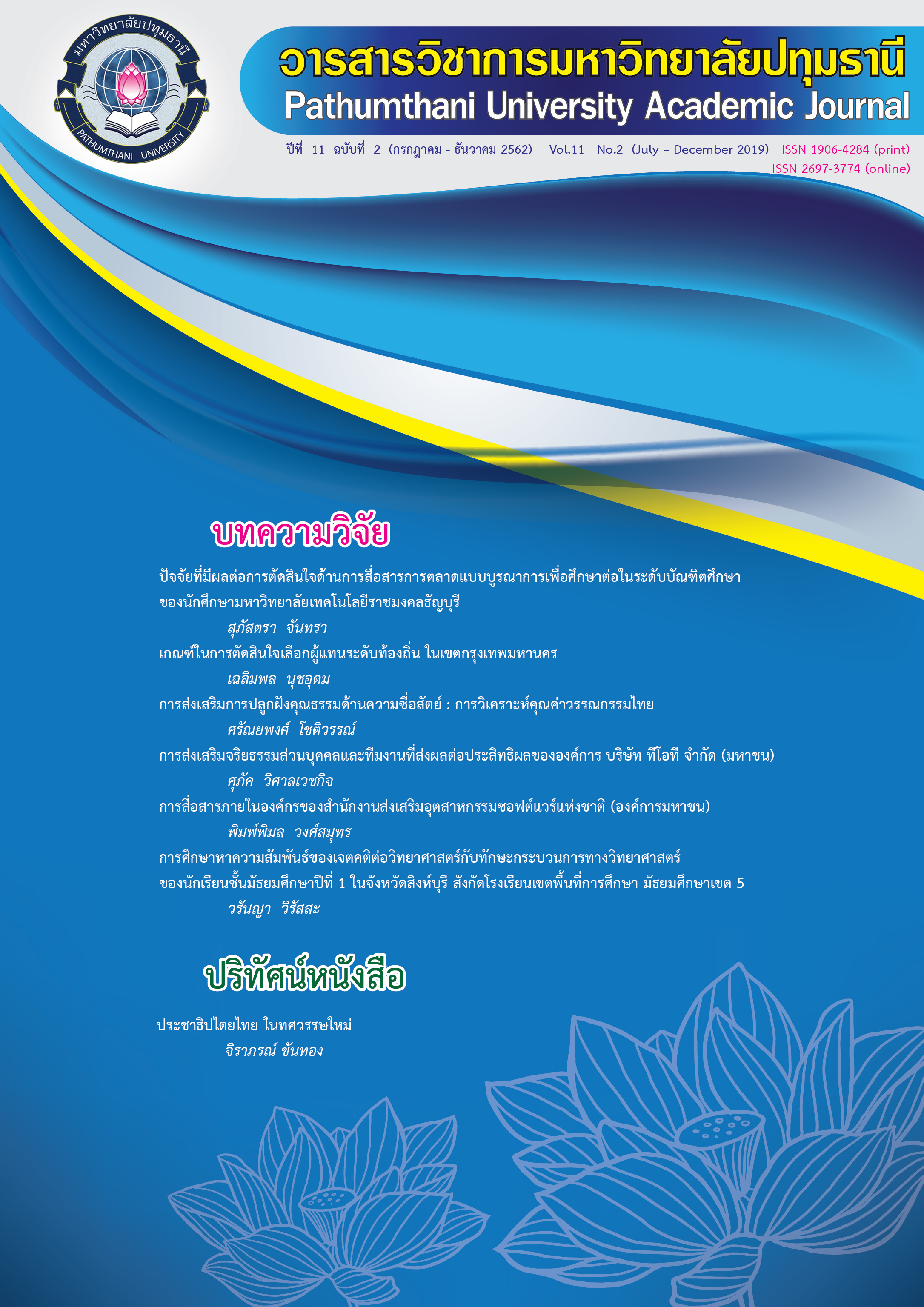The Personal and Team wotk with ethical impacts on the effectiveness to the TOT public company enterprise
Keywords:
Support, Ethical personal, Team work, Excellent organization, Organizational EffectivenessAbstract
This research has three objectives namely, 1. The personal and Team wotk with ethical impacts on the effectiveness to the TOT public company enterprise. 2. The relationship between ethical personal and team work impacts on the effectiveness of TOT public company enterprise. 3. Multiple regression of the ethical promotion impact on ethical effectiveness the TOT public company enterprise. The sample size of TOT 300 persons tools for research is questionairs and interview Statistical methods descriptive, percentage, mean, standard diviation(SD) and inductive to find the relationship between dependent and independent variables. The analysis of Pearson correlation and multiple regression analysis by stepwise method. The research finding, the ethical composition of personal is the most important, followed by excellent organization, teamwork to the TOT effectiveness . All aspects are positive to the Hypothesis test. Also the multiple regression of ethical promotion to personal and team work impacts on the effectiveness of TOT public company limited enterprise and comprised ethical personal, teamwork and excellent organization. The recommendation to further research the study of the objective and willingness in resisting anykind of corruption in the organization, and pay more attention to good governance. In order to find the different promotion, he should study on way to promote things impact effectiveness in different forms such as Leadership, organization culture, learning organization that all results can apply to the public enterprise that need similar promotion.
References
2.เดือนเด่น นิคมบริรักษ์. (2555). กรณีการแจกมือถือ ไอโฟน 4S กับมาตรฐานจริยธรรมของหน่วยงานภาครัฐ. สถาบันวิจัยเพื่อการพัฒนาประเทศไทย. กรุงเทพมหานคร.
3.เยาวลักษณ์ จิตต์วโรดม. (2548). จริยธรรมทางธุรกิจเพื่อการเติบโตขององค์กรอย่างยั่งยืน. วารสารวิชาการ มหาวิทยาลัยหอการค้าไทย. กรุงเทพมหานคร.
4.ลักษมี ทุ่งหว้า. (2547). เจตคติของพนักงานที่มีต่อการบริหารองค์การตามหลักบรรษัทภิบาล. วิทยานิพนธ์ปริญญามหาบัณฑิต คณะบริหารธุรกิจ มหาวิทยาลัยรามคำแหงกรุงเทพมหานคร.
สานิตย์ หนูนิล. (2556). การพัฒนาจริยธรรมในองค์การผ่านกระบวนการบริหารทรัพยากรมนุษย์. วารสารมหาวิทยาลัยศิลปากร ฉบับภาษาไทย ปีที่ 33 ฉบับที่ 1 พ.ศ. 2556. กรุงเทพมหานคร.
5.Beer, M. et al. (1984) Human Resource Management : A General Manager’s Perspective. New York: Free Press.
6.Dales, M. , & Hes, K. (1995). Creating training miracles. Sydney, Australia: Prentice-Hall.
7.De Lorme, D., Zinkhan, G. M., & French W. (2001) “Ethics and the Internet: Issues associated with qualitative research”. Journal of Business Ethics, 33(4), 271-286.
8.Ferrell, Fraedrich & Ferrell. (2008). Business Ethics : Ethical Decision Making and Case. Boston, MA : Houghton Mifflin.
9.Ferrier,W.J., Smith, K.G. and Grimm, C.M. (1999). The role of competitive action in market share erasion and industry dethronement: A study of industry leaders and challengers. Acdemy of Management Journal, 42:372-388.
10.Jean Piaget, (1997). The Moral Judgment of the Child. (London: Routledge&Kegan Paul Ltd.,1997). Pp. 133-134
11.Hall, M, J. (2002). Aligning the organization to increase performance results. The Public Manager.
12.Hofstede, Greet H. (2001). Culture’s Consequences: International Differences in Work- Related Values. California: Sage.
13.Holbeche, Linda. (2004). “HR and the highPerformance Organization”. Strategic HR Review. Vol.5 No. 2.
14.Locke, E. A. and Latham, A. (1979). A Theory of Goal Setting and Task Performance. Upper Saddle River: Prentice-Hall.
15.Maslow Abraham, (1987). Motivation and Personnality. New York: Harper and Row Publisher, 1987, pp. 15-23.
16.McClelland, David C. (1953). The Achievement Motive. New York: Appleton-Century-rofts.
17.Nagelsmith, L. (1995). Competence : An Evolving Concept. The Journal of Consulting Education in Nursing.
18.Nina, Mazar. (2007) The Dishonesty of Honest People : A Theory of Self-Concept Maintenance. Toroto : University of Toronto.
19.Mondy, Noe, and Premeaux. (1999). Human Resource Management. Upper Saddle River NJ: Simon and Sehuster Company.
20.Samson, Danny, and Challis, David. (2002). “Patterns of Business Excellence”. Measuring Business Excellence. 6, 2:15-21.
21.Terziovski. Mile. (2002). Achieving Performance Excellence Through an Intergrated Strategy of Radical Innovation and Continuous Improvemant. Measuring Business Excellence 6, 2: 5-14.
22.Valentine, S., Godkin, L. & Lucero, M. (2002). Ethical context, organizational commitment, and person–organization fit. Journal of Business Ethics, 41, 4 (December), 349–360.
23.Walton, Richard E. (1973). “Quality of Working life: What is it?”. Sloan Management Review, 4(7), 20-23.
24.Weaver, G. R. & Treviño, L. K., (2001). “The role of human resources in ethics/compliance management: A fairness perspective”. Human Resource Management Review, 11: 113- 134.
25.William, J. E. (1997). “Total Quality Management / Continuous Improvement - Initiation and Implementation : A Diffusion Study of Two Northeast Ohio Public School Districts”. Dissertation Abstracts International. 57 (08) : 3355.
Downloads
Published
How to Cite
Issue
Section
License
บทความที่ได้รับการตีพิมพ์เป็นลิขสิทธิ์ของวารสารมหาวิทยาลัยปทุมธานี
ข้อความที่ปรากฎในบทความแต่ละเรื่อง เป็นความคิดเห็นส่วนตัวของผู้เขียน กองบรรณาธิการไม่จำเป็นต้องเห็นด้วยเสมอไป และไม่มีส่วนรับผิดชอบใด ๆ ถือเป็นความรับผิดชอบของผู้เขียนแต่เพียงผู้เดียว



